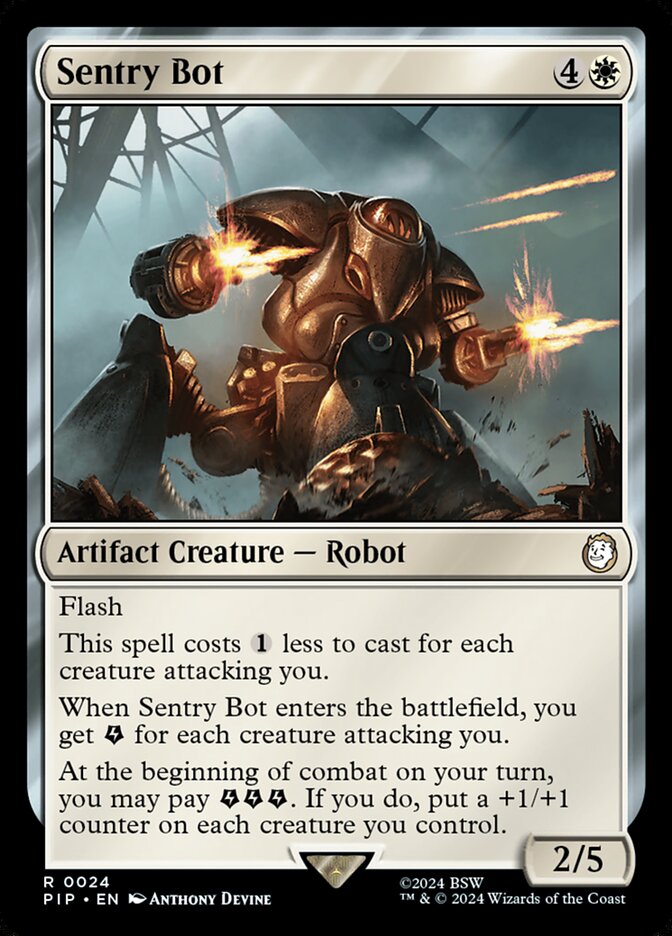
Sentry Bot {4}{W}
Artifact Creature — Robot
Flash
This spell costs {1} less to cast for each creature attacking you.
When Sentry Bot enters, you get {E} for each creature attacking you.
At the beginning of combat on your turn, you may pay {E}{E}{E}. If you do, put a +1/+1 counter on each creature you control.
2/5
Illustrated by Anthony Devine
- Standard
- Not Legal
- Alchemy
- Not Legal
- Pioneer
- Not Legal
- Explorer
- Not Legal
- Modern
- Not Legal
- Historic
- Not Legal
- Legacy
- Legal
- Brawl
- Not Legal
- Vintage
- Legal
- Timeless
- Not Legal
- Commander
- Legal
- Pauper
- Not Legal
- Oathbreaker
- Legal
- Penny
- Not Legal
| Faces, Tokens, & Other Parts |
|---|
| Energy Reserve Card, TPIP #21 |
| Sentry Bot, PIP #899 |
| Prints | USD | EUR | TIX |
|---|---|---|---|
| Fallout #24 | $0.10 | €0.16 | 1.03 |
| Fallout #371 | $0.28 | 0.81 | |
| Fallout #552 | ✶ $1.10 | ||
| Fallout #899 | ✶ $0.94 | ||
| View all prints → | |||
Toolbox
Buy This Card
Notes and Rules Information for Sentry Bot:
- The cost-reduction ability of Sentry Bot doesn’t change its mana cost or mana value, only the total cost you pay. Specifically, the mana value of Sentry Bot is always 5. (2024-03-08)
- Once you announce that you’re casting Sentry Bot, no player may take actions until you’re done casting it. Notably, opponents can’t remove creatures from combat to try to change Sentry Bot’s total cost. (2024-03-08)
- Use the number of creatures attacking you as Sentry Bot’s third ability resolves to determine the number of energy counters you get. (2024-03-08)
- {E} is the energy symbol. It represents one energy counter. (2024-03-08)
- Energy counters are a kind of counter that a player may have. They’re not associated with any specific permanents. (2024-03-08)
- Keep track of how many energy counters each player has. Potential ways to track this include writing them down on paper or using dice, but any method that is clear and mutually agreeable is fine. (At higher levels of tournament play, dice may not be allowed for tracking counters that players have.) (2024-03-08)
- If an effect says you get one or more {E}, you get that many energy counters. To pay one or more {E}, you lose that many energy counters. You can’t pay more energy counters than you have. Any effects that interact with counters a player gets, has, or loses can interact with energy counters. (2024-03-08)
- Energy counters aren’t mana. They don’t go away as steps, phases, and turns end, and effects that add mana “of any type” can’t give you energy counters. (2024-03-08)
- Some triggered abilities state that you “may pay” a certain amount of {E}. You can’t pay that amount multiple times to multiply the effect. You simply choose whether or not to pay that amount of {E} as the ability resolves. (2024-03-08)
- Some triggered abilities that state that you “may pay” a certain amount of {E} describe an effect that happens “If you do.” In that case, no player may take actions to try to stop the ability’s effect after you make your choice. If the payment is followed by the phrase “When you do,” then you’ll choose any targets for that reflexive triggered ability and put it on the stack before players can take actions. (2024-03-08)
- If a spell or ability with one or more targets states that you “may pay” some amount of {E}, and each permanent that it targets has become an illegal target, the spell or ability won’t resolve. You can’t pay any {E} even if you want to. (2024-03-08)
- Some spells and abilities that give you {E} may require targets. If each target chosen is an illegal target as that spell or ability tries to resolve, it won’t resolve. You won’t get any {E}. (2024-03-08)